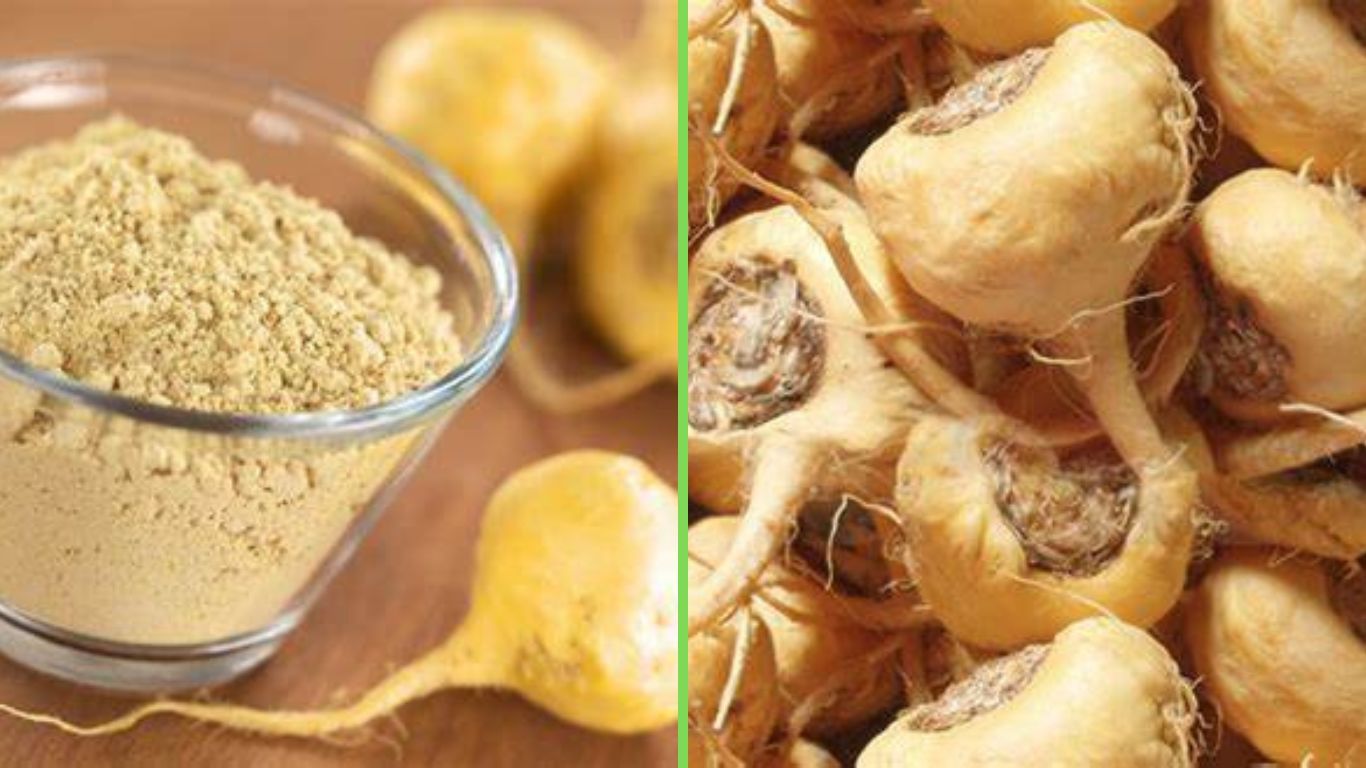Unveiling The Power Of Maca Root: The Secret To A Healthier You
Unlock the hidden benefits of maca root, an ancient superfood with a long history of use in traditional medicine. Discover how this plant can improve your health and well-being

Maca root is a superfood that has been used for centuries by the indigenous people of the Andes Mountains in Peru. Maca is not only packed with essential vitamins and minerals but also contains several bioactive compounds that can provide various health benefits.
Page Contents
Despite its long history of use, the true potential of maca root is still not widely known. In this article, we'll take a deep dive into the ancient secrets of maca root to unlock the hidden benefits of this superfood.
Discover the amazing properties of maca root and learn how it can help to improve your overall health and well-being.
A Brief History of Maca Root: Origins And Traditional Use by Indigenous People of The Andes
Maca root (Lepidium meyenii) is a cruciferous vegetable that is closely related to other members of the same family, such as broccoli, kale, and cauliflower.
Native to the Andes Mountains, maca root has a long history of use by the indigenous people of the region who discovered its amazing health benefits.
The origins of maca root can be traced back to the pre-Incan civilization, where it was considered a sacred plant and used for both nutritional and medicinal purposes.
According to ancient legends, maca root was believed to have been a gift from the gods and was highly valued for its ability to increase strength, endurance, fertility, and overall vitality.
For centuries, maca root remained a staple food for the indigenous people of the Andes, and it was often traded for other goods such as salt and grains. It was also used as a form of currency in some parts of the Andes.
Traditionally, maca root was consumed by the Andean people in its raw or cooked form.
The root was either roasted or boiled before being ground into a fine powder, which was then used to make a nutritious drink or as a seasoning for other foods.
In addition to its culinary use, maca root was also used by the indigenous people for its medicinal properties. It was believed to help with a variety of health conditions such as anemia, infertility, and fatigue. It was also used as a natural aphrodisiac and to provide stamina for long and demanding workdays.
Today, the consumption of maca root has spread beyond South America and into many other parts of the world. It has gained popularity as a superfood, and its potential health benefits are being studied by scientific researchers.
Despite its newfound fame, maca root remains an important cultural symbol for the indigenous people of the Andes, who continue to use it as part of their traditional diets and medicines.
Maca Root And Hormones: How This Superfood Can Naturally Balance Your Body's Endocrine System
Maca root is a superfood that has been traditionally used by the indigenous people of the Andes to improve hormonal health.
Modern research has now confirmed that maca does have hormonal balancing properties, making it a popular natural remedy for hormonal imbalances.
The endocrine system is responsible for producing hormones that regulate various bodily functions, including growth and development, metabolism, sexual function, and mood.
When the endocrine system is not functioning correctly, it can result in hormonal imbalances that can lead to a range of health problems.
Maca root contains multiple compounds that work to balance hormones in the body.
The maca plant contains unique compounds called macamides and macaenes that help to stimulate the pituitary gland, which regulates the production of hormones in the body.
Maca also contains various sterols, which interact with the hormonal system to provide further balancing effects.
Specifically, maca root has been found to help regulate estrogen levels in women. Estrogen imbalances can cause a range of symptoms, including irregular periods, PMS, infertility, and mood swings.
Studies have shown that maca can help to balance estrogen levels in women, leading to a reduction in symptoms associated with estrogen dominance.
Similarly, maca has been found to help balance testosterone in men. Testosterone imbalances can cause symptoms such as low libido, decreased muscle mass, and fatigue.
Maca has been shown to help increase testosterone levels in men with low levels of the hormone, leading to an improved libido and energy levels.
Maca root has also been found to help regulate cortisol levels, which is the hormone responsible for our stress response.
High cortisol levels can lead to anxiety, depression, and fatigue. Maca has been found to help reduce cortisol levels, leading to improved mood and better stress management.
The Science Behind Maca Root: Exploring Its Unique Nutritional Profile And Phytochemical Compounds
Maca root is a relatively low-calorie food, containing approximately 91 calories per 100 grams.
However, it is a rich source of several essential vitamins and minerals, making it a highly nutritious food.
Maca root is an excellent source of vitamin C, copper, and iron, all of which are essential for optimal health.
It also contains significant amounts of potassium, manganese, and zinc, which are essential for maintaining healthy bones and teeth, muscle function, and immune function.
In addition to its impressive nutritional profile, maca root contains several unique phytochemicals that are responsible for its medicinal properties. These phytochemicals include:
- Macamides and Macaenes: Maca root contains macamides and macaenes, which are thought to have adaptogenic properties. Adaptogens help the body to cope with stress by improving the immune system's response to stressors.
- Glucosinolates: Maca root contains glucosinolates, which are known for their cancer-fighting properties. Glucosinolates break down into compounds called isothiocyanates, which have been shown to prevent the formation of cancer cells.
- Alkaloids: Maca root contains several alkaloids, including macaridine and nicotine, which are thought to have an analgesic effect (pain-relieving effect). Additionally, these alkaloids have been shown to improve memory and learning abilities.
- Polyphenols: Maca root contains several polyphenols, including kaempferol and quercetin, which are potent antioxidants that protect the body from oxidative stress.
Maca Root For Energy: Can This Ancient Superfood Help You Fight Fatigue And Increase Stamina?
Modern research has confirmed the energy-boosting properties of maca root, making it a popular natural remedy for fatigue.
Maca root contains several compounds that work together to increase energy levels and improve stamina.
These compounds include vitamins B and C, iron, and magnesium, all of which are essential for energy production in the body.
Maca root also contains unique alkaloids and amino acids that help to improve energy levels.
One of the primary ways that maca root helps to combat fatigue is by improving the oxygen-carrying capacity of red blood cells.
Research has shown that maca root can increase the production of erythropoietin, a hormone that stimulates the production of red blood cells in the body.
This results in a greater number of red blood cells, which can transport more oxygen to the body's tissues and organs, improving energy levels and reducing fatigue.
Additionally, maca root has been found to improve physical performance and stamina during exercise.
Studies have shown that consuming maca root can help to improve endurance, speed, and strength in athletes.
This may be due to the ability of maca root to improve oxygen delivery to the muscles, as well as its ability to reduce oxidative stress and inflammation in the body.
Maca root also contains adaptogenic compounds that help the body cope with stress. Stress is a significant contributor to fatigue, and by reducing stress levels, maca root can help to improve energy levels.
The adaptogenic compounds in maca root work to regulate the body's stress response, helping to improve energy levels and reduce fatigue.
How Maca Root Can Improve Your Mood And Mental Well-being: An in-depth Look at The Research
Modern research has confirmed that the unique compounds present in maca root can indeed help to improve mood, anxiety, and depression.
Maca root contains different bioactive compounds, such as polyphenols, alkaloids, and glucosinolates, that contribute positively to our mental well-being.
Maca root has been shown to stimulate the production of neurotransmitters like serotonin in the brain.
Serotonin is a neurotransmitter responsible for regulating mood, sleep, and appetite, and low levels of serotonin are linked to depression and anxiety.
Clinical trials have demonstrated that maca root increases serotonin levels in the body, resulting in improved mood, less anxiety, and less depression.
Maca root has also been found to improve cognitive function, memory, and learning.
Several studies have shown that maca root supplementation can enhance cognitive function, which includes attention span, working memory, verbal learning, and recall.
Moreover, it is thought that maca root may help to increase acetylcholine levels, a neurotransmitter associated with memory and cognitive function, contributing to increased learning and memory.
Furthermore, maca root contains polyphenols, which are potent antioxidants that protect the brain cells from oxidative stress and inflammation, which are linked to several mental health disorders.
Inflammation in the brain has been linked to several mental health disorders, such as depression and anxiety, and oxidative stress can cause neurodegenerative diseases such as Alzheimer's and Parkinson's diseases.
Finally, stress reduction is another way maca root can improve mood and mental well-being.
Maca root's adaptogenic compounds can help the body to cope with stress and reduce the production of stress hormones such as cortisol, which reduces anxiety and overall stress levels.
Maca Root And Fertility: Separating Fact From Fiction And Exploring the evidence behind Its Use as a Fertility Aid
Maca root is believed to have fertility-boosting properties and has been traditionally used for centuries as a natural remedy for infertility.
However, while maca root has gained popularity as a fertility aid, there is limited scientific evidence to support its effectiveness in this regard.
Maca root contains several compounds that are believed to have fertility-boosting properties, including glucosinolates, macamides, and macaenes.
These compounds are thought to help regulate hormone levels in the body and improve sperm count and motility.
One of the primary ways that maca root may improve fertility is by improving sperm count and motility.
Several studies have found that maca root supplementation can improve semen quality and increase sperm count and motility in both men and animals.
However, the findings of these studies are not consistent, and more research is needed to determine the true potential of maca root as a fertility aid.
Maca root has also been found to have potential benefits for female fertility. Studies have shown that maca root may help to regulate estrogen levels in women, leading to improved fertility.
However, these findings are limited, and more research is required to determine the mechanisms behind maca root's effect on female fertility.
Additionally, maca root has been found to have potential benefits for libido and sexual function, which may indirectly improve fertility.
Some studies suggest that maca root may help to improve sexual desire, arousal, and satisfaction, leading to an increase in sexual activity and a higher chance of conception.
The Potential Anti-cancer Properties of Maca Root: Emerging Research on This Natural Compound
Maca root is a cruciferous vegetable that is native to the Andes Mountains of Peru. It has gained popularity as a superfood due to its unique nutritional profile and medicinal properties.
Recent studies are also exploring the potential of maca root as a natural treatment for cancer.
Maca root contains several bioactive compounds that have been shown to have anti-cancer properties. These compounds include glucosinolates, polyphenols, and alkaloids.
Glucosinolates, in particular, have received a lot of attention for their potential anti-cancer properties.
Studies have shown that these compounds can help to protect against cancer by inducing apoptosis (programmed cell death) and reducing the growth of cancer cells.
This effect is thought to be due to glucosinolates being converted into isothiocyanates when maca root is consumed.
Maca root also contains several polyphenols, which are potent antioxidants that protect cells from oxidative stress and inflammation.
Oxidative stress and inflammation are linked to the development and progression of cancer.
By reducing oxidative stress and inflammation, maca root may help to prevent the development of cancer cells.
Alkaloids, such as macaridine and nicotine, which are also found in maca root, have shown promising results in slowing the growth of cancer cells in vitro.
Furthermore, these compounds have been shown to have potent anticancer properties and may contribute to maca root's overall anticancer effects.
Studies have shown that maca root may have anticancer effects on several types of cancer, including breast, colon, and liver cancer.
While the research into the anticancer properties of maca root is still in its early stages, the results have been promising.
Maca Root Recipes: Delicious And Nutritious Ways to Incorporate This Superfood Into Your Daily Diet
Maca root is a nutrient-packed superfood that has been used for centuries to boost energy, stamina, and fertility.
It has a nutty, earthy flavor that can be incorporated into many different types of recipes. Here are some delicious and nutritious maca root recipes that you can enjoy daily.
Maca root smoothie
Start your day off right with this energizing smoothie! Simply combine one cup of cold or room temperature almond or coconut milk with one tablespoon of maca powder, one banana, one teaspoon of honey (or another sweetener), and one scoop of your favorite protein powder. Blend until smooth, then enjoy!
Maca root oatmeal
A healthy breakfast packed with nutrients! Cook one cup of oatmeal according to the package directions. Once the oatmeal is done, add in two tablespoons of maca powder, one teaspoon of honey (or another sweetener), and ¼ cup of chopped nuts or seeds. Mix well and enjoy!
Maca avocado toast
Toast two slices of whole grain bread and spread 1/4 an avocado over each slice. Sprinkle two teaspoons of maca powder over the top and season with salt and pepper to taste. Enjoy as a light lunch or snack.
Chocolate maca treat
Satisfy your sweet tooth cravings with this delicious treat! Melt three ounces of semi-sweet or dark chocolate chips in a small saucepan over low heat until melted and creamy.
Add 1/4 cup peanut butter or almond butter, two tablespoons coconut oil, and two tablespoons maca powder to the melted chocolate mixture; mix well until combined.
Remove from heat and let cool for five minutes before spooning onto parchment paper lined baking sheet in small round shapes about 2 inches wide (optional: sprinkle extra cocoa nibs or sea salt for garnish).
Place in fridge for 30 minutes to harden before enjoying!
Baked plantain chips with maca
Make these crunchy chips at home using just three ingredients – plantains, olive oil spray, and maca powder.
Preheat oven to 375 degrees F (190 C). Peel two large ripe plantains; use a sharp knife to cut crosswise into thin slices about 1/8 inch thick (about 4-6 mm).
Arrange slices on parchment paper lined baking sheet and spray both sides lightly with olive oil spray; sprinkle about 1 teaspoon maca powder over them evenly then flip them over again so the other side gets sprinkled too; repeat the process for the rest of the plantain slices on baking sheet.
Bake at 375 degrees F (190 C) for 15 minutes or until golden brown; remove from oven & let cool completely before serving as chips with salsa dip.
These recipes are easy to make at home using simple ingredients that you likely already have in your pantry, proving how versatile this superfood is. If you're looking for more creative ways to incorporate this ancient food into your diet then don't forget to check out cooking blogs, food magazines, or recipe books dedicated specifically to making dishes featuring maca root as the star ingredient.
Conclusion
Maca root has been used for centuries to boost energy, stamina, and fertility. It is a nutrient-packed superfood with many potential health benefits, including the ability to reduce inflammation and even fight cancer.
By incorporating maca into your daily diet through smoothies, oatmeal recipes, avocado toast, or delicious chocolate treats you can enjoy its unique nutty flavor as well as all of its amazing health benefits.
With so many creative ways to use this ancient food in cooking it's no wonder why more people are turning towards maca root as part of their healthy lifestyle regimen.
Unlocking the secrets of maca root may be just what you need to give your body that extra nutritional boost it needs.

